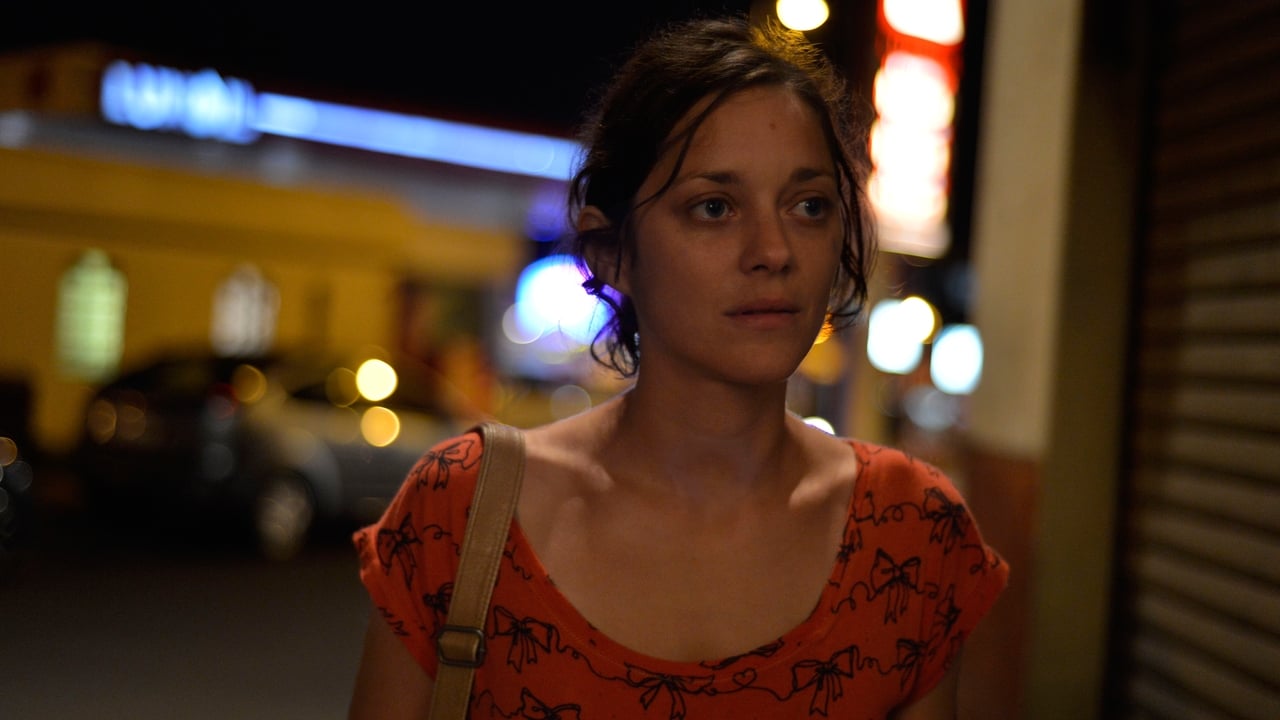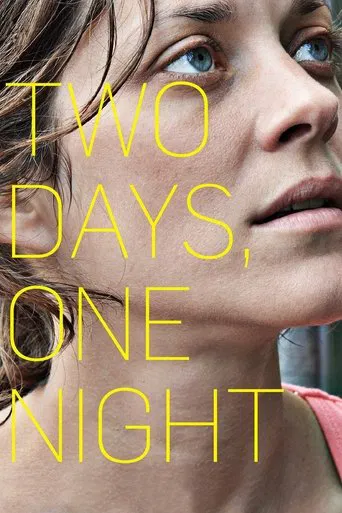

The subject matter of the Dardenne's "Two Days, One Night" is unusual, to say the least, for a mainstream movie in this day and age, (though perhaps not for the Dardenne's who have made their name from squeezing the 'drama' out of dramatic material). It's about industrial relations, or rather it's about one woman fighting to keep her job, concentrating to a large degree on her psychological state over the short period of the film and there's no denying that Marion Cotillard is very good in the part and yet I never felt involved. In truth, nothing very much happens; Marion spends her time going round her co-workers asking each of them in turn to vote for her in a secret ballot. After a time this gets very dull indeed. It's certainly an intelligent film and it's nicely done but over this, give me the hysteria and the melodrama of "Norma Rae" any day.
... View MoreI mainly found out about this Belgian-French-Italian film because of the leading actress being nominated during awards season, I had no idea what it was about, I was just hoping for something worthwhile, directed by brothers Jean-Pierre Dardenne and Luc Dardenne (Rosetta, The Kid with a Bike). Basically in the industrial town of Seraing, near Liège, Belgium, Sandra Bya (Oscar nominated Marion Cotillard) is a young wife and mother to two children, she works for Solwal, a small solar- panel factory. After suffering a nervous breakdown, Sandra has been forced to take time off from her job, on medical leave for depression. During Sandra's absence, shop foreman and her immediate supervisor Jean- Marc (Olivier Gourmet) suggests to the boss, M. Dumont (Batiste Sornin), that her section of the company can function with sixteen people working full time with a bit of overtime. The management proposes a 1,000 bonus to all staff if they agree to make Sandra redundant, near the end of her medical leave she returns to work and discovers that her fate rests in the hands of her sixteen co-workers. Sandra's friend and co-worker Juliette (Catherine Salée) learns a "show of hands" vote was held, the result a 13-3 decision for the bonuses over Sandra's job, Juliette knows Jean-Marc is determined to get rid of Sandra. The vote was influenced by scare mongering through misinformation, but Juliette and Sandra at the end of the Friday working day are to convince Dumont to hold another secret ballot on Monday morning. Sandra needs a majority to keep her job, meaning nine votes, by Saturday morning, Sandra's supportive husband Manu (Fabrizio Rongione) convinces her that over the weekend she should speak to all thirteen of her colleagues who voted for the bonuses to get them to change their minds. They not only need the income from Sandra's job, but Manu believes the job is a symbol for Sandra, to prove her own self worth and for her mental state. Sandra reluctantly goes about this task, visiting and finding her colleagues one by one, most of the co-workers however need the proposed bonus for their own families. Finally it comes to Monday morning, the factory workers have a second ballot, but the vote is tied, with eight votes to keep the bonus and eight for Sandra to leave, as a result, Sandra will lose her position. However, the factory manager calls Sandra into his office, he agrees to give her a job, but in the end, she decides to turn it down, Sandra has found the emotional strength to deal with the situation and the confidence to start anew, to pursue a new life for herself. Also starring Pili Groyne as Estelle, Simon Caudry as Maxime, Alain Eloy as Willy, Myriem Akheddiou as Mireille, Fabienne Sciascia as Nadine and Timur Magomedgadzhiev as Timur. I can see why Cotillard was nominated the Oscar, she gives it her all as the ordinary working-class woman coming out of depression now on the edge trying to keep her job, it is a fairly simple humanistic story, the majority of which is just the leading character knocking on doors and talking to her co-workers about whether they will change their mind or not, but it is interesting enough to keep you hooked until the end, a worthwhile drama. It was nominated the BAFTA for Best Film Not in the English Language. Very good!
... View MoreGiven the premise of this story I think most people could come up with a script to equal or surpass the one in this movie. The premise has a boss of seventeen blue-collar employees present them with the decision to forgo their bonuses in favor of not laying off a particular woman. That woman is Sandra (Marion Cotillard) whom we get to know throughout the movie. Sandra is recovering from an episode of depression and is just coming back to work, only to find out about the vote where the majority of employees voted to keep their bonuses. That would send most any person into a depression, so Sandra is indeed in a tough situation, given her already delicate emotional state. Also, she has a husband and two young children and losing her job would have a devastating effect on the family. Feeling that her foreman had biased the vote by telling people that even if Sandra were saved, someone else would be fired, Sandra appeals to the big boss for a re-vote, and that is granted. From there the movie slips into low gear as Sandra tracks down her fellow employees and tries to convince them to vote in her favor. One after another we see her finding out where her colleagues live and going to their homes. She is seen, in *long* takes, walking, riding the bus, and being driven by her husband to the homes. What develops is pretty predictable. Some workers are swayed and some just feel that, given their situation, they cannot give up the bonuses they had worked for. We see how lower middle class people have a hard time of it and how varied their situations are.I guess that there are some bosses dumb enough to set up a situation like the one portrayed here. The way these decisions are usually handled is to make the proposition of forfeiting bonuses, or raises, in favor of keeping all the staff on board, rather than signaling out a specific employee. Some things did point to why Sandra might have been singled out though. She had been on sick leave for depression with her ability to function in question, and the remaining employees could take up the slack in her absence. I got the feeling that Sandra was not particularly well liked and was surprised by how little she knew about her fellow employees, particularly given there were only sixteen others for her to know. It's not surprising that this situation produced a lot of strong emotional reactions--jobs and money strike at the heart of people's lives.I like Marion Cotillard and feel she was good in this difficult role. Given that she is portraying a woman recovering from depression she has few highly dramatic scenes, so to appreciate her performance you have to key on her subtle reactions. The movie illustrates the difficulty in dealing with a depressed person and I vacillated between being irritated with Sandra's husband and his apparent insensitivity by goading his wife into painful situations that could easily send her back into full-scale depression. But then I had to realize what a delicate situation he was dealing with and moderated my opinion. Getting through this was a bit of a slog. I found my attention had to be restrained from wandering.
... View MoreWatching Inception again a few months ago with a family friend,I got told that co-star Marion Cotillard has done a number of strong French films.Taking a look one day round Netflix UK,I was very happy to find one of Cotillard's titles on the site,which led to me getting set to watch it,for two days and one night.The plot:Trying to get back into work after battling depression, Sandra discovers that her workmates have voted her out,in exchange for a 1000 Euro pay rise.Talking to friend Julien,Sandra discovers that manager Jean-Marc threatened some of the workers with the sack,if they did not vote her out.Getting hold of the company CEO,Sandra gets a second vote agreed on,in two days time. Needing over half her fellow workers to vote on her side,Sandra decides to spend the next 2 days meeting each worker,and putting her case across to them.View on the film:Coming from the documentary world,co-writers/directors Jean-Pierre & Luc Dardenne soak the film in an incredibly intimate atmosphere,via long takes giving each of Sandra's meetings with her fellow workers a rustic glaze. Keeping away from any "big" camera moves,the Dardenne's marvellously follow Sandra with well-held hand-held cameras,which along with giving the movie an on the spot presentation,also gives all the conversations in the title a stark, naturalistic quality.Set against the financial crisis, the screenplay by the Dardenne's turns off the TV channels to focus on what effect the events are having on people at the bottom of the ladder.Taking an episodic edge,the Dardenne's use each meeting to gradually bring themes from the background to the front of the screen,from the very male-dominated workplace,to Sandra discovering her own independence. Walking on egg shells whilst hold her head high, Marion Cotillard gives an extraordinary performance as Sandra. Slumping her shoulders with each rejection, Cotillard displays the lingering scent of depression in its most naked form,and gradually peels open a proud vitality in Sandra,over 2 days and 1 night.
... View More